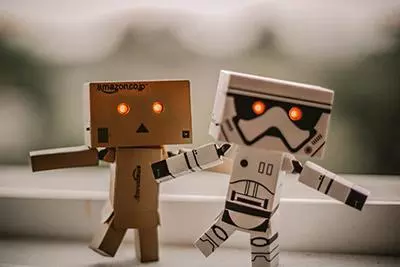 Whilst browsing round the web looking for things to include in this month's 3aIT newsletter, the thing that immediately leapt out was that 80% of the articles were about AI. Probably relatedly, we are also getting initial enquiries from some clients about whether any of these new tools they've read about would help their business. We have therefore decided to put this blog together explaining our thoughts on this as a company, what we are doing about it now, and what it might mean for the future.
Whilst browsing round the web looking for things to include in this month's 3aIT newsletter, the thing that immediately leapt out was that 80% of the articles were about AI. Probably relatedly, we are also getting initial enquiries from some clients about whether any of these new tools they've read about would help their business. We have therefore decided to put this blog together explaining our thoughts on this as a company, what we are doing about it now, and what it might mean for the future.
What has changed?
It would be easy to get the impression from the current explosion of interest in AI that having it usable by the average person is a new thing. However, we've all being using AI for years. For example. unlocking your mobile with your face, social media filtering out fake news, banks detecting fraud or Netflix suggesting what you should watch next are all examples of AI we use every day.
 The applications of AI that have caught the headlines recently are largely those that use what's known as "Generative" AI. This is what lies as the heart of systems like ChatGPT. These are systems that have been trained on enormous amounts of existing data, and then essentially regurgitate that data in any way you want via natural language prompts. It's this leap in what looks like something "understanding" what you're saying, being able to act on that and doing it very convincingly in most cases that has got everyone so excited.
The applications of AI that have caught the headlines recently are largely those that use what's known as "Generative" AI. This is what lies as the heart of systems like ChatGPT. These are systems that have been trained on enormous amounts of existing data, and then essentially regurgitate that data in any way you want via natural language prompts. It's this leap in what looks like something "understanding" what you're saying, being able to act on that and doing it very convincingly in most cases that has got everyone so excited.
Do I need to care?
About ChatGPT as it stands, probably not. It is a great showcase for where things are at right now, but other than a few specific applications for which being able to churn out several paragraphs of human-appearing text is useful (essays, blogs etc), it probably has limited applications to the business world. Especially as it is currently prone to "hallucinations" - making up information that looks plausible but isn't true. There are also tentative steps by search companies like Google and Bing towards using the ideas behind ChatGPT to answer your search query directly rather than provide you with a list of websites that do. This may have big implications for the search engine optimisation industry, but will just be a nice new feature for most people.
 However, as to whether you should care about what these advances mean for the world of work in a wider context, we think the answer is almost certainly yes. Although the timescales are currently vague, any element of your job that involves using a computer to essentially do what you (or anyone else) have done before is likely to be replaced with AI that can do that for you.
However, as to whether you should care about what these advances mean for the world of work in a wider context, we think the answer is almost certainly yes. Although the timescales are currently vague, any element of your job that involves using a computer to essentially do what you (or anyone else) have done before is likely to be replaced with AI that can do that for you.
AI is also going to open up avenues that have previously been unavailable. You won't need a load of disparate reports on your company's system. AI will be able to be taught to understand what that data means, and then you can get it to present that to you in any form you like using natural language. "Show me last month's sales figures for John Smith and Jane Doe in a line graph" for example.
Uh oh! Should I be retraining as a lumberjack?
 By all means if you want, but don't panic just yet. This is hardly the first time that a revolutionary technology has come along and rendered all or some of huge swathes of jobs redundant. As ever, these jobs will change to adapt, and new ones will appear that harness the new technology. As people that support and develop web-based IT systems, we're doing jobs that didn't exist 30 years ago. This is likely to be change on a similar scale as the widespread adoption of the internet.
By all means if you want, but don't panic just yet. This is hardly the first time that a revolutionary technology has come along and rendered all or some of huge swathes of jobs redundant. As ever, these jobs will change to adapt, and new ones will appear that harness the new technology. As people that support and develop web-based IT systems, we're doing jobs that didn't exist 30 years ago. This is likely to be change on a similar scale as the widespread adoption of the internet.
Therefore, the best approach in the short to medium term is likely to be to lean into these new developments. Keep an ear to the ground and proactively investigate any advances that look like they could either help you do your job, or ultimately do most of your job for you. There's no point sticking your head in the sand over this. It's likely anyone that isn't a handful of years from retirement is going to have to face this AI-assisted future whether they like it or not. It's better to go with the flow and get a head start on those resistant to change!
What is 3aIT doing about it internally?
We're taking our own advice above! There are risks and rewards to be found on both sides of our business. One thing that AI is already fairly good at is writing code (assuming it's a problem that has been solved before). Obviously, that sets off alarm bells for our developers in terms of how their skills will be relevant in the future. However, AI is certainly not infallible here, and is unlikely to be for a while yet. Therefore, we're going to be trialling AI systems that make code suggestions that we can choose to include if they look right – hopefully allowing us to get more done in less time. In the longer term, it may be we need to pivot to spending less of our time writing user interfaces, and more of it getting AI to understand your data so that it can generate the interfaces for you.
 On the support side, we will be looking at anything that involves a lot of repetition and whether we can use tools to either entirely or partly automate it. We have solved most of the support requests we get many times before, and have logged our solutions to those problems in a ticket system that could be used to train an AI system. We pride ourselves on providing knowledgeable and friendly support, but we are not blind to the fact that if other support companies are able to reduce cost to business by essentially automating most of their support department, no amount of helpfulness on our part will be able to compete with cold hard business logic of using a cheaper, largely automated service that is almost as good. Therefore, while we have no current plans to start sending automated support emails to our clients, we will certainly be trialling systems that remove some of the legwork in doing this manually.
On the support side, we will be looking at anything that involves a lot of repetition and whether we can use tools to either entirely or partly automate it. We have solved most of the support requests we get many times before, and have logged our solutions to those problems in a ticket system that could be used to train an AI system. We pride ourselves on providing knowledgeable and friendly support, but we are not blind to the fact that if other support companies are able to reduce cost to business by essentially automating most of their support department, no amount of helpfulness on our part will be able to compete with cold hard business logic of using a cheaper, largely automated service that is almost as good. Therefore, while we have no current plans to start sending automated support emails to our clients, we will certainly be trialling systems that remove some of the legwork in doing this manually.
What about your clients?
As well as looking at ways that AI can help us help our clients, we are also looking at ways that it could help them directly. Naturally, that will vary depending on the client. This could involve automating elements of customer service, providing marketing teams with tools to create AI generated or assisted content, and access to various convincing text-to-speech generators.
In the longer term, this is likely to also involve integrating AI into the systems we build so they provide better answers to the questions you have about all the data about your business that you store.
So you can automate my entire workforce today?
 No, and we'll add an important word of warning here. Given the current hype surrounding AI, it is very likely that a load of new companies will pop up that make big promises and use a lot of buzzwords to convince you that they are the future, and they can revolutionise your business. Whilst there will certainly be some that know what they're talking about, there will be a LOT that are after a quick buck and just churn through companies hoping to take your money for as long as possible before you realise they can't actually do what they suggested.
No, and we'll add an important word of warning here. Given the current hype surrounding AI, it is very likely that a load of new companies will pop up that make big promises and use a lot of buzzwords to convince you that they are the future, and they can revolutionise your business. Whilst there will certainly be some that know what they're talking about, there will be a LOT that are after a quick buck and just churn through companies hoping to take your money for as long as possible before you realise they can't actually do what they suggested.
While we're in warning mode, entirely separately to the above but just as important, scammers WILL use these new tools to create ever more convincing methods to try and part you with your money and / or online logins. We will cover this in more detail in future blogs once any trends become apparent, but this is likely to lead to scams that don't have some of the bad grammar / layout giveaways that a lot of current scams include.
Enough vagueness - anything I can actually use now?
Yep, there's ChatGPT, obviously. Microsoft have harnessed this same technology in Bing, and it's live right now. Just hit the "Chat" menu item to start. Google have their own version of this called Bard.
For those that are involved in content generation for their business, tools like Jasper could provide ideas or even full articles to fill your websites and marketing materials.
While tools like Teams can already transcribe meetings that are carried out using the app, Fireflies takes that a step further and will transcribe any meeting for you - even those held offline (assuming the audio has been recorded). Once your meeting is in the system, you can turn it into action points or filter through the text for specific key words you're interested in.
The technology we have our eye on that's likely have the biggest immediate impact for a lot of the clients we deal with is Microsoft's "CoPilot" AI technology that they are bringing to their 365 apps. It's well worth having a look at their blog introducing this. Microsoft is trialling this right now with a select group of businesses and should be rolling it out to all 365 users in the coming months.
Are we all going to end up as slaves to the robots if we pursue this path?
 People that have spent a lot of time thinking about this are uneasy about what the future may bring. However, when Google's Bard AI thinks there's no letter 'e' in the word ketchup, you probably don't need to worry just yet. For as far as it's possible to see into the future on this, we will be working in conjunction with AI rather than for AI.
People that have spent a lot of time thinking about this are uneasy about what the future may bring. However, when Google's Bard AI thinks there's no letter 'e' in the word ketchup, you probably don't need to worry just yet. For as far as it's possible to see into the future on this, we will be working in conjunction with AI rather than for AI.
Also, there's no putting this genie back in the bottle now. Despite talk of governments scrambling to regulate AI systems, potential sizable economic gains for countries that allow the most experimentation here means the race will always be on to push things a bit further.
So will you be reformatting your name to 3 AI Technology?
 The thought has certainly crossed our minds, and it's not impossible we will focus our efforts in that direction in the future if and when it becomes clear this is the best way to help our clients get the best out of their staff and their systems.
The thought has certainly crossed our minds, and it's not impossible we will focus our efforts in that direction in the future if and when it becomes clear this is the best way to help our clients get the best out of their staff and their systems.
To end on a note of optimism for anyone that might be worried for the future having read the above, the one thing that AI is rubbish at is understanding something it's never seen before, or creating something based on a new idea. While it seems inevitable that the repetitive bits of our day-to-day will get automated, that means what we will be left with is the interesting stuff - the innovation and creativity. A future where humans are given more time to do what only humans can do seems pretty bright to us.
